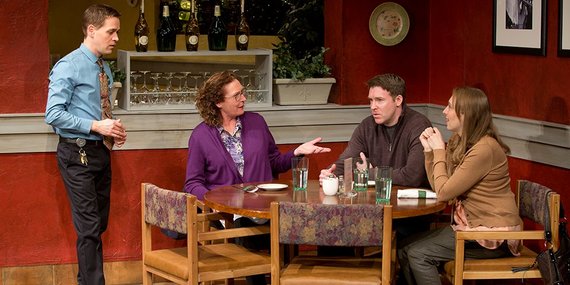Review:
Award winning playwright Samuel D. Hunter speaks tombs of heartbreaking truth about isolation and the vanishing distinctiveness of American life in his new play, Pocatello.
It seemed like the play was over in a matter of moments, not the 1 hour and 40 minutes it took to perform it. In Pocatello, Idaho at a restaurant that looks like every chain you have ever seen along the highway, an engaging ensemble of characters disassemble pieces of themselves revealing their demoralized lives. There is little glue to hold them together since it seems they are all broken from the inside and as the outside has no landmark to guide them through their respective lives, they are unmoored, ungrounded, lost. Pocatello reflects the pervasive indignity of the corporate culture which has taken over everywhere, making everything look like anywhere.
Brands like Target, The Olive Garden, Home Depot, and Dress Barn take the place of familiar, welcoming local restaurants, the hardware store where you once had a relationship with the owner, and clothing stores where the salespeople knew you and your family with the knowingness of years of shopping there.
These places mark ones territory here on earth, as does a crumbling house that half stands on the grounds where the main character Eddie's great grandfather built it. Now, it is being used occasionally as a drug and sex hang-out and where he sometimes fills his terrible loneliness with thoughts of his homesteading family making their lives there in the happy ignorance of an alarming destiny a hundred years from being realized. Eddie, played by T.R. Knight is a kind hearted, quiet guy in his early 30's who runs the local chain restaurant where he employs Max (Cameron Scoggins), Isabelle (Elvy Yost), and Troy (Danny Wolohan). The Restaurant seems to be the only solid environment Eddie has in his life which makes him loath to tell the staff that it is being closed by corporate because the profits are not there. Eddie's older brother Nick played by Brian Hutchinson comes to town for a visit with his wife Kelly (Crystal Finn), after being away for many years with good reason. With their mother in tow the family sits at one of the dining tables anticipating their order with complaining and annoying conversation which masks the disquiet of having to be there in the first place. Eddie attends to them with grateful desperation and will put up with anything as long as they stay. Upstage in a booth sits Troy the waiter's family; his alcoholic wife Tammy (Jessica Dickey) with his elderly father Cole (Johnathan Hogan) who is losing it and has to live in the wretched county home. Their daughter Becky (Leah Karpel) is so super sensitive she finds it difficult to eat for fear of hurting anyone or anything. Even lettuce can be tainted with everything from pesticides, to a farm worker being exploited. Depressed, she is constantly mining her sense of wrong as a result of being raised with disappointing parents and the outcome of a hypocritical and reckless society.
Like so many great playwrights before his generation, Mr. Hunter tailgates nicely onto the classics of the American masters. In this tale there are no delusion's, the truth is so profoundly present you can't turn your back towards dreams. The reality is so starkly immediate, there is no time for that; it demands attention... Finally, even if the reality isn't pretty, we need each other to make it through the ever changing terrain.
The outstanding performances belong to: Elvy Yost who was a delightful Isabelle, an honest egg, who just tells it like it is and rolls with the punches. She entered the stage with no less honesty than she exited it with. Brenda Wehle was an excellent Doris, but became even more so as the play unfolded. It was her maternal display of humanity which escapes out of the box of self-protection, so cleverly unwrapped, which got to me. While most of the performances were quite good, these two ladies and the almost cracked enough to be believable grandfather Cole were powerful. Just turn the screw a little bit tighter and make the nuances slightly more inescapable.
Samuel D. Hunter's Pocatello is a play very much worth the price of admission at Playwrights Horizons!

